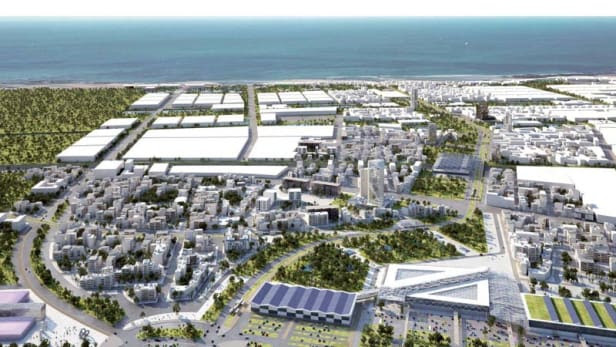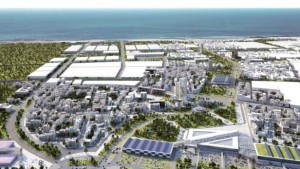Devex
Inside Development Produced In Partnership: Smart Cities
By Christin Roby
@robyreports
CASABLANCA, Morocco — A short distance outside Casablanca, the bustling city turns into open fields, grazing animals and remnants of an industrial site.
Kids run between tall, white apartment buildings where clothes hang from the windows, as adults walk to Friday prayer service at the pink and blue mosque that serves as the neighborhood focal point.
Not far away, construction workers lay gray bricks as a new residential area takes shape.
Welcome to the beginnings of Zenata Eco-City, an innovative urban development project in Morocco that aims to present a possible solution to African urbanization issues and also to the broader international community, as many nations across the globe attempt to respond to growing urban populations. Developing new cities in African countries could pose a high rewarding potential where urban populations are expected to increase by 15 percent by 2030, according to the World Bank.
Zenata is a locally designed and managed city created on the basis of three fundamental sustainable development pillars: environmental, social and economic. Within this framework, designers put a focus on air quality, sewage, transport, and most importantly, job creation. Leaders at the Zenata Development Company — known by its French name Société d’Aménagement Zenata, or SAZ — say their systemic approach is unique in building a sustainable, environmentally friendly and well-connected city all the way from conception to realization.
What also makes Zenata distinct, its creators and backers say, is an ecologically responsible design that maximizes use of natural resources at a city scale. Thirty percent of the city’s first development phase has been set aside as green space, with a central park to promote biodiversity. Wind directions have been modelled to allow natural cooling from the Atlantic Ocean, which borders the community. A mixed sewage collection system that redirects rainwater toward retention ponds contributes to the development of the naturally green landscape.
Zenata is one of many planned cities sprouting up in Morocco, thanks to a national agenda introduced by King Mohammed VI, which includes major institutional reform and an expansive development plan. Since 2009, strategic plans, environmental impact assessments and technical feasibility studies shaped the project until 2012, when the first phase of the commercial center began and land plots for hotels, services and facilities were sold.
SAZ focused strictly on what concerned the project locally, Mohamed Naciri, SAZ business development director, told Devex, and from there developed a framework that answered exactly the needs of their project. “We benchmarked and we looked at all the international standards but we realized they were not fit to us, they did not fit the environment and local issues,” said Naciri.
Although Zenata is a 30-40 year project, SAZ has already moved from conception to realization. For the first development zone — an area of 2,000 acres (800 hectares) — the major sewage system is complete. The first interchange and major roads provide access to the area and the first phase of the retail center is open, with an IKEA store welcoming customers daily.
Zenata expects to be a family and leisure destination. “We hope to have 15 to 18 million visitors per year that will spend at least half a day, up to a weekend with us,” Naciri said.
Alongside visitors, Zenata has an ambition to attract up to 300,000 residents via their economic model, which includes the construction of an integrated health care and biomedical center, an international university campus, and Morocco’s largest shopping center. These facilities are expected to create 100,000 jobs. An industrial zone will provide manufacturing jobs, while the shopping center will offer retail opportunities. Zenata will feature more than 20,000 meters of walking lanes, as well as internal trams, buses and taxis.
Building a city is not easy, Naciri told Devex. Urbanization can have positive or negative impacts on societies. In some cases, urbanization leads to economic growth, a greater exchange of ideas/talents and poverty reduction. Urban living is also usually associated with a higher standard of living. But at times, it can stymie progress and cause further inequality, housing shortages and social impacts surrounding lack of opportunities for the entire population. The development team at Zenata has tried to minimize the negative impact by intertwining solutions to these problems into their master urban plan.
The most complex part, Naciri said, was working with the vast numbers of partners at the state, national and international levels. Swiss experts helped develop the internal traffic plan. European funders invested and private local companies made plans for relocation and installation. “It’s what we call in French ‘la gouvernance’ and it’s the overall management of all parties and it’s not an easy issue, but it’s essential to work with everyone at the same time, so you face it head on,” he said.
Zenata also focused on the social inclusion of people who resided in the area prior to development. The land was inhabited by roughly 40,000 people living in slums. As preparations began for phase one, local inhabitants were relocated to temporary housing in apartments nearby, and as part of the urban master plan, Zenata has designated a portion of land for residents to rebuild. Zenata Marketing Project Officer Sakina Agoumi said job creation and attracting businesses to Zenata was a major part of the development plan.
Agoumi told Devex they considered the local populations in their plans, including in building additional schools and mosques. However, in the future, she expects Moroccans to relocate to Zenata based on the economic opportunities it offers and its proximity to the nearby major cities of Casablanca and Rabat.
This ambitious undertaking was made possible, in part, by the financial support of the European Investment Bank and the Agence Française de Développement, who have financed the first development zone each with 150 million euros.
“As long as the project, in fact, actually follows the plan of modern services which will make it possible to maintain the social equilibrium and to promote social skills through job creation, this project will strengthen the country,” said AFD Morocco President Eric Baulard.
In October 2015, Zenata Eco-City was acknowledged as a model project and awarded an exclusive Eco-City Label by French international HQE certification agency, Cerway, which applauded the project’s ability to minimize its environmental impact throughout its entire lifecycle. The eco-city label now serves as a performance assessment model for comparable urban projects in a similar contexts, nationally and internationally, alike.
According to Naciri, receiving an HQE label, the equivalent to LEED or green building standards, illustrates the feasibility of such large-scale development projects in Africa.
“The fact that Zenata received the recognition of an international significator about the work being done for the first time in the development of a sustainable city, in Morocco, in Africa, is an innovation on it’s own,” Naciri told Devex. “That’s what’s exotic about Zenata, it will show the way for urban projects that are similar to ours in emerging countries, and especially Africa.”
Editor’s note: The Agence Française de Développement facilitated Devex’s travel and logistics for this reporting. However, Devex maintains full editorial control of the content.
Over six weeks, Devex — along with our partners Agence Française de Développement, BearingPoint, UN-Habitat, and XII Metropolis World Congress — will explore what it takes to build a successful smart city, how climate resilient and environmentally friendly infrastructure and technologies are being implemented, and how actors in the global development community are working together toward common goals and engaging local communities in an inclusive way. Join us as we examine what it takes to create our smart cities of the future by tagging #SmartCities and @Devex.
About the author
Christin Roby
@robyreports
Christin Roby is a West Africa correspondent for Devex based in Abidjan, Ivory Coast where she covers global development trends, health, technology and policy-related topics. Before relocating to West Africa, Christin spent several years working in local newsrooms, and earned an MSJ in videography and global affairs reporting from the Medill School of Journalism at Northwestern University. Her informed insight into the region stems from her diverse coverage of more than a dozen African nations








